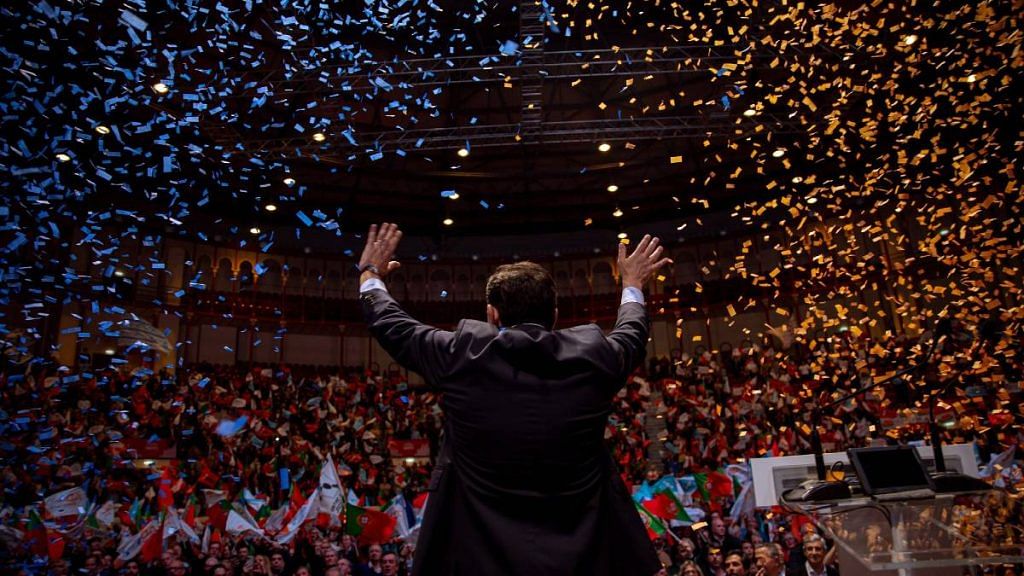New Delhi: The Democratic Alliance (AD), a Centre-Right coalition, claimed victory in the elections held in Portugal Sunday, in a setback for the Socialist Party (PS) in one of western Europe’s poorest countries. No party won a majority in the 230-seat unicameral parliament of Portugal.
“The Portuguese people have spoken, and they have said they want a different government, different policies, renewed parties and dialogue among their leaders,” Luís Montenegro, the leader of the AD coalition, was reported as saying in the media after the results were announced early Monday. The leader of the PS, Pedro Nuno Santos, conceded defeat.
The AD and its allies won a total of 79 of 230 seats, according to results published by the Portuguese Ministry of Internal Administration (MAI). The PS, which has been in power in Portugal since 2015, won 77 seats — a loss of 43 seats from the 2022 election. The AD won about 28.63 percent of the votes polled while the PS won about 28.66 percent of the total votes polled.
Sunday’s election also saw the far-Right party Chega (Enough!) win 18.06 percent of the total votes polled and about 48 seats — its best performance since it was formed in 2019.
This year marks 50 years since the fall of the fascist Estado Novo (New State) regime in Portugal and a return to democracy. The Estado Novo was led by António Salazar between 1932 and 1968 and later by Marcelo Caetano till its fall in 1974.
In comparison to other countries within the European Union (EU), Portugal for long had seen far-Right political parties relegated to the margins of its political spectrum. However, this year, ahead of the elections in the EU in June, the populist-Right or far-Right parties across continents have seen a resurgence in popular support across its 27 member states.
The snap elections in Portugal were called after prime minister António Costa of the Socialist Party resigned in November 2023 amid allegations of corruption against his close aides.
Also Read: Is Europe’s pursuit of security delusional? West must fix its internal maladies first
Fall of a socialist goliath
Costa, three-time PM of Portugal, came to power in 2015 despite the PS winning only 32.3 percent of the total votes cast, in comparison to the centre-right coalition of then prime minister Pedro Passos Coelho winning a total of 38.6 percent of votes.
Coelho’s Centre-Right coalition, Forward Portugal, won 107 seats in the 230-member house, but was unable to gain the nine seats required to govern. Costa, who is of Goan descent from the paternal side, was able to cobble together support from other leftist parties and the Portuguese far Left.
In 2019, Costa’s governance record saw the PS increase its seats to 108 from 86 in 2015. Costa’s popularity reached its zenith in the 2022 snap elections, when the PS won an outright majority in the parliament of Portugal, winning 120 seats.
However, Costa’s political rise as a socialist goliath in the Iberian country ended on 7 November, 2023, when Portuguese police raided his official residence and detained his chief of staff, Vítor Escária. Costa, possibly the most visible of socialist leaders across the EU, resigned that afternoon.
With the PS’ loss in Sunday’s election, only five leaders from the Party of European Socialists (PES) —the Centre-Left pan-European political party — govern across the 27 member-states. Only four leaders from the Centre-Left will now be present at meetings of the European Council, the forum where the heads of state and governments of EU members meet, as Romania’s representative in the council, president Klaus Lohannis, represents a different political party from that of Romanian PM Marcel Ciolacu. The latter’s party is part of the PES.
The four leaders representing the PES in European Council meetings are Olaf Scholz, chancellor of Germany, Pedro Sánchez, prime minister of Spain, Mette Frederiksen, prime minister of Denmark and Robert Abela, prime minister of Malta.
Rise of the far-right
Chega’s victory in 48 seats in Portugal is part of the larger trend of the growth of populist/far-Right movements across the EU.
The far-right party Rassemblement National (RN) in France is polling 13 percentage points ahead of French president Emmanuel Macron’s own party as the EU elections loom, according to an opinion poll carried out by pollster Ipsos-Sopra Steria, in partnership with Sciences Po’s Cevipof Centre, the Institut Montaigne, the Fondation Jean Jaurès and Le Monde.
Up to 31 percent of individuals polled have indicated their votes for the RN, in comparison with only 18 percent indicating support for Macron’s Renaissance party. Jordan Bardella, 28, leader of the RN, is considered the second most popular leader in France, another opinion poll released earlier this month found.
The think tank European Council on Foreign Relations (ECFR) has forecast a huge increase in seats for populist Right, “anti-European Union” parties in the EU elections likely in June.
The ECFR predicts that such populist parties will top the vote-share in nine EU countries — Austria, Belgium, the Czech Republic, France, Hungary, Italy, the Netherlands, Poland and Slovakia. They are further expected to finish second or third in another nine countries — Bulgaria, Estonia, Finland, Germany, Latvia, Portugal, Romania, Spain and Sweden.
(Edited by Nida Fatima Siddiqui)
Also Read: Securing Ukraine is very much part of Europe’s agenda. But when will Kyiv join NATO?
